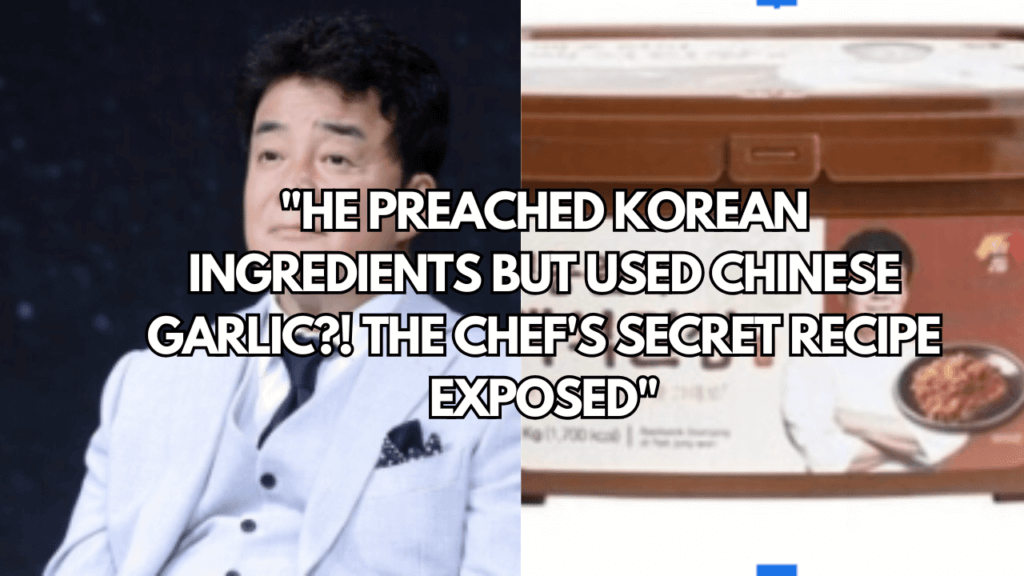Paik Jong Won Labeling Violations Leave Fans Stunned as Investigation Unfolds
Celebrity chef and beloved TV personality Paik Jong Won is facing serious legal troubles that have sent shockwaves through the Korean entertainment industry. The Paik Jong Won labeling violations case has officially escalated with formal indictments announced on March 13. The chef’s company, The Born Korea, stands accused of misrepresenting the origin of ingredients in popular products that many Seoul Crushers have likely enjoyed at home. These Paik Jong Won labeling violations could potentially result in hefty fines or even prison time for the famous chef.
The Serious Nature of Paik Jong Won Labeling Violations
The Seoul Office of the National Agricultural Products Quality Management Service’s Special Judicial Police has launched a thorough investigation into Paik’s business practices. The chef faces two specific counts of breaching the Country of Origin Labeling Act related to two of his most popular products. His Baekseok Doenjang (fermented soybean paste) and Hanshin Pocha’s stir-fried octopus are at the center of this growing controversy.
See also: Animated Pucca Tribute Celebrates BLACKPINK Rosé Bruno Mars APT
The investigation revealed that the Baekseok Doenjang, produced at Born Korea’s Baekseok factory, contains several imported ingredients despite being marketed as “Korea-made.” These non-local components include Chinese modified menu, soybeans from Canada, the US, and Australia, and wheat flour from Australia and the US. This misrepresentation directly violates Korean labeling regulations that require truthful disclosure of ingredient origins. The Paik Jong Won labeling violations are particularly troubling given the chef’s previous advocacy for transparency in food labeling.
Adding to the severity of these allegations, the factory itself is problematically located in an agricultural promotion zone. Such zones legally restrict facilities to processing only domestically produced agricultural and marine products. This location-based violation alone could result in prison sentences of up to five years or fines reaching ₩50 million KRW (approximately $34,500 USD).
Chef Paik’s Legal Trouble Extends to Multiple Products
The second product under scrutiny further complicates the chef’s legal trouble. The stir-fried octopus dish distributed by The Born Korea allegedly contains Chinese garlic, despite advertisements claiming all ingredients (including green onions, onions, and garlic) were locally sourced. Though The Born Korea only handles distribution of this product, with manufacturing done by another company, they remain legally responsible for accurate labeling.
If found guilty of these violations, the consequences could be severe. Paik Jong Won faces potential prison sentences of up to seven years or fines reaching ₩100 million KRW (approximately $68,900 USD). Beyond these legal penalties, the chef’s reputation hangs in the balance. A whistleblower involved in the case has publicly demanded that Paik issue a formal apology for what they describe as hypocritical actions.
The irony hasn’t been lost on fans and industry observers. Throughout his career, Paik has built his brand partly on advocating for transparent food labeling and supporting local producers. His cooking shows often emphasize the importance of knowing where ingredients come from. Now, these same principles are at the center of his legal challenges.
The investigation continues to unfold with new details emerging regularly. Industry experts note that the outcome could have far-reaching implications for food labeling practices throughout South Korea’s packaged food industry.
Final Thoughts on the Paik Jong Won Labeling Violations Case
The allegations against Paik Jong Won represent a significant fall from grace for one of Korea’s most trusted culinary figures. As the investigation progresses, many fans are left wondering how this will affect his numerous television shows, restaurant chains, and product lines. The chef has yet to issue a public statement addressing these serious charges.
The case highlights the importance of truthful product labeling and the consequences that can follow when regulations are ignored, even by beloved public figures. For a personality who has built his brand on authenticity and transparency, these allegations strike at the very heart of Paik’s public persona.
What do you think about these accusations against Chef Paik? Should celebrities be held to higher standards when it comes to their business practices? Share your thoughts in the comments below!






